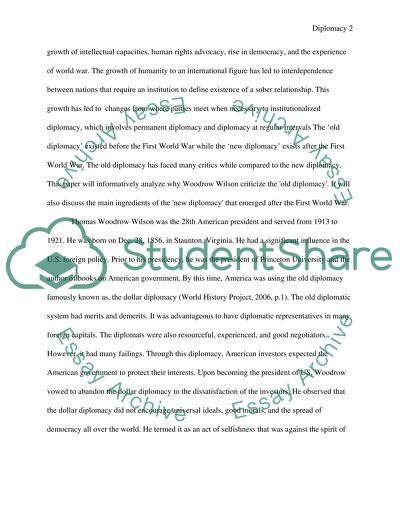Cite this document
(“Why did Woodrow Wilson criticise the 'old diplomacy' What were the Essay”, n.d.)
Why did Woodrow Wilson criticise the 'old diplomacy' What were the Essay. Retrieved from https://studentshare.org/miscellaneous/1591032-why-did-woodrow-wilson-criticise-the-old-diplomacy-what-were-the-main-ingredients-of-the-new-diplomacy-that-emerged-after-the-first-world-war
Why did Woodrow Wilson criticise the 'old diplomacy' What were the Essay. Retrieved from https://studentshare.org/miscellaneous/1591032-why-did-woodrow-wilson-criticise-the-old-diplomacy-what-were-the-main-ingredients-of-the-new-diplomacy-that-emerged-after-the-first-world-war
(Why Did Woodrow Wilson Criticise the 'Old diplomacy' What Were the Essay)
Why Did Woodrow Wilson Criticise the 'Old diplomacy' What Were the Essay. https://studentshare.org/miscellaneous/1591032-why-did-woodrow-wilson-criticise-the-old-diplomacy-what-were-the-main-ingredients-of-the-new-diplomacy-that-emerged-after-the-first-world-war.
Why Did Woodrow Wilson Criticise the 'Old diplomacy' What Were the Essay. https://studentshare.org/miscellaneous/1591032-why-did-woodrow-wilson-criticise-the-old-diplomacy-what-were-the-main-ingredients-of-the-new-diplomacy-that-emerged-after-the-first-world-war.
“Why Did Woodrow Wilson Criticise the 'Old diplomacy' What Were the Essay”, n.d. https://studentshare.org/miscellaneous/1591032-why-did-woodrow-wilson-criticise-the-old-diplomacy-what-were-the-main-ingredients-of-the-new-diplomacy-that-emerged-after-the-first-world-war.


